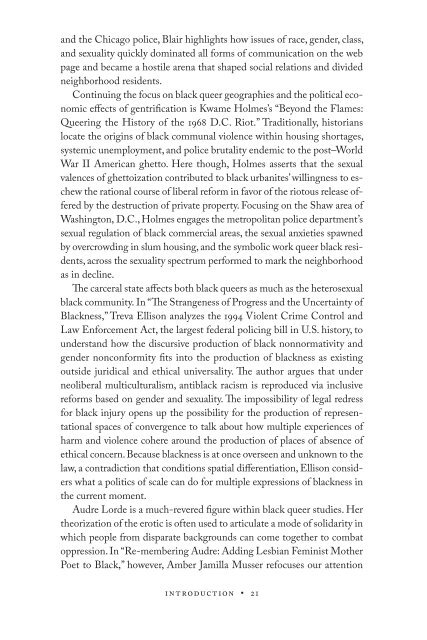No Tea
89AS6wvrf
89AS6wvrf
Create successful ePaper yourself
Turn your PDF publications into a flip-book with our unique Google optimized e-Paper software.
and the Chicago police, Blair highlights how issues of race, gender, class,<br />
and sexuality quickly dominated all forms of communication on the web<br />
page and became a hostile arena that shaped social relations and divided<br />
neighborhood residents.<br />
Continuing the focus on black queer geographies and the po liti cal economic<br />
effects of gentrification is Kwame Holmes’s “Beyond the Flames:<br />
Queering the History of the 1968 D.C. Riot.” Traditionally, historians<br />
locate the origins of black communal vio lence within housing shortages,<br />
systemic unemployment, and police brutality endemic to the post– World<br />
War II American ghetto. Here though, Holmes asserts that the sexual<br />
valences of ghettoization contributed to black urbanites’ willingness to eschew<br />
the rational course of liberal reform in favor of the riotous release offered<br />
by the destruction of private property. Focusing on the Shaw area of<br />
Washington, D.C., Holmes engages the metropolitan police department’s<br />
sexual regulation of black commercial areas, the sexual anx i eties spawned<br />
by overcrowding in slum housing, and the symbolic work queer black residents,<br />
across the sexuality spectrum performed to mark the neighborhood<br />
as in decline.<br />
The carceral state affects both black queers as much as the heterosexual<br />
black community. In “The Strangeness of Pro gress and the Uncertainty of<br />
Blackness,” Treva Ellison analyzes the 1994 Violent Crime Control and<br />
Law Enforcement Act, the largest federal policing bill in U.S. history, to<br />
understand how the discursive production of black nonnormativity and<br />
gender nonconformity fits into the production of blackness as existing<br />
outside juridical and ethical universality. The author argues that under<br />
neoliberal multiculturalism, antiblack racism is reproduced via inclusive<br />
reforms based on gender and sexuality. The impossibility of legal redress<br />
for black injury opens up the possibility for the production of repre senta<br />
tional spaces of convergence to talk about how multiple experiences of<br />
harm and vio lence cohere around the production of places of absence of<br />
ethical concern. Because blackness is at once overseen and unknown to the<br />
law, a contradiction that conditions spatial differentiation, Ellison considers<br />
what a politics of scale can do for multiple expressions of blackness in<br />
the current moment.<br />
Audre Lorde is a much- revered figure within black queer studies. Her<br />
theorization of the erotic is often used to articulate a mode of solidarity in<br />
which people from disparate backgrounds can come together to combat<br />
oppression. In “Re- membering Audre: Adding Lesbian Feminist Mother<br />
Poet to Black,” however, Amber Jamilla Musser refocuses our attention<br />
Introduction • 21


